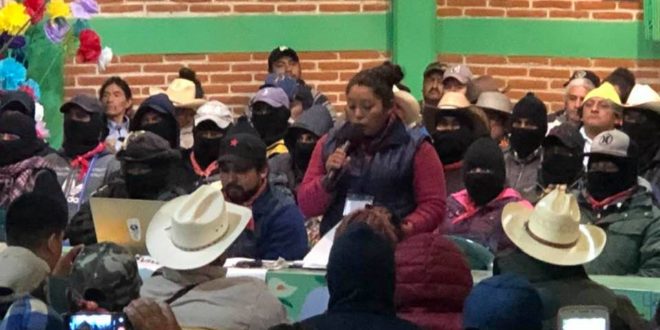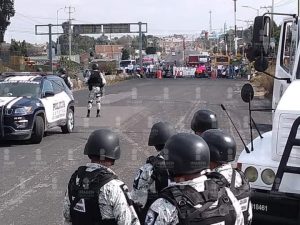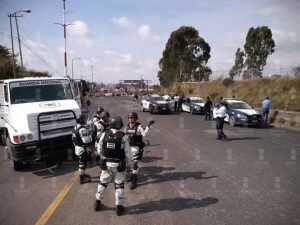
CNI
(Español) Pronunciamiento conjunto de la Cuarta Asamblea Nacional del CNI-CIG y EZLN
Escucha aquí: [podcast]https://radiozapatista.org/wp-content/uploads/2019/12/IVasambleaCNI-CIG_pronunciamiento.mp3[/podcast]
Al pueblo de México
A los pueblos del Mundo
A la Sexta Nacional e Internacional
A las Redes de Resistencia y Rebeldía
A los medios de comunicación
Hermanos, hermanas
Desde el Caracol Zapatista Jacinto Canek, en el CIDECI- UNITIERRA, en San Cristóbal de las Casas, Chiapas, los días 18 y 19 de diciembre de 2019, para celebrar la 4ª Asamblea Nacional del Congreso Nacional Indígena y el Concejo Indígena de Gobierno los pueblos Afromexicano, Binizaa, Chinanteco, Chol, Chontal, Comca’ac, Hñahñu, Kumiai, Mam, Maya, Mayo, Mazahua, Me´phaa, Mixe, Mixteco, Nahua, Náyeri, Purépecha, Quiché, Rarámuri, Téenek, Tepehuano, Tohono Oódam, Tojolabal, Totonaca, Tzeltal, Tzotzil, Wixárika, Yaqui, Zoque, Chixil, Cañari y Castellano, provenientes de 24 estados de la república, así como invitados de Guatemala, Ecuador, El Salvador y Estados Unidos, nos encontramos para escucharnos, para ver en el compañero y compañera que en colectivo somos pueblos, naciones y tribus.
Nos encontramos para ver y entender la guerra neoliberal que de arriba viene cubierta de mentiras simulando gobernar, cuando ponen el país en manos del gran capital, al que le estorba la conciencia colectiva de los pueblos y echa a andar su maquinaria de despojo:
1. A través de la violencia sanguinaria y terrorista en contra de los pueblos que defienden la tierra.
El luto y la rabia que nos habita a quienes hoy nos encontramos, es por el daño a la madre tierra, el despojo de todas las formas de vida. Y aquellos que decidieron destruirla para convertirla en dinero tienen nombre y apellido, así como los asesinos de nuestros compañeros. Nos duele en el corazón colectivo el asesinato del compañero delegado popoluca del CNI, Josué Bernardo Marcial Campo, también conocido como TíoBad quien por su arte, su música y su protesta en contra de los megaproyectos que el mal gobierno pregona haber terminado como es el fracking, fue desaparecido y encontrado brutalmente asesinado el pasado lunes 16 de diciembre.
El compañero Samir Flores Soberanes del pueblo nahua de Amilcingo, Morelos
(Español) México: “Resistimos y estamos vivos”, pronunciamiento de pueblos originarios del CNI-CIG
San Cristóbal de las Casas, Chiapas. 19 de diciembre. Más de 30 pueblos originarios de México, se reunieron en la Cuarta Asamblea Nacional entre el Congreso Nacional Indígena (CNI) y el Concejo Indígena de Gobierno (CIG), en el nuevo Caracol Zapatista Jacinto Canek, en el CIDECI de San Cristóbal de las Casas, para analizar la “guerra capitalista”, contra los pueblos indígenas en el país; así como para reflexionar el porqué de la lucha y la resistencia como comunidades del CNI. Con un sentimiento de “luto y rabia”, describieron las comunidades indígenas su sentir con respecto al daño a la “madre tierra y a todas las formas de vida”. Los que destruyen la tierra “tienen nombre y apellido”, aseguraron.
De igual forma mencionaron uno a uno a sus compañeros a los cuales les fue arrebatada la vida por parte del “mal gobierno en todos sus niveles y de los grupos narco paramilitares que le sirven”. Dentro de sus compañeros caídos están: Samir Flores Soberanes del pueblo nahua de Amilcingo, Morelos; Julián Cortés Flores, del pueblo mephaa de la casa de justicia de San Luis Acatlán, Guerrero; Ignacio Pérez Girón, del pueblo tsotsil del municipio de Aldama, Chiapas; José Lucio Bartolo Faustino, Modesto Verales Sebastián, Bartolo Hilario Morales, e Isaías Xanteco Ahuejote. del pueblo nahua organizado con el Concejo Indígena y Popular de Guerrero – Emiliano Zapata (CIPOG – EZ); Juan Monroy y José Luis Rosales, del pueblo nahua de Ayotitlán, Jalisco, y Feliciano Corona Cirino, compañero del pueblo nahua de Santa María Ostula, Michoacán.
Así también los pueblos originarios denunciaron las “consultas mentirosas”, de la autodenominada “cuarta transformación”, que “ignora y ofende” su organización y toma de decisiones como pueblos indígenas. “Señalamos que resistimos y estamos vivos”, afirmaron los pueblos en resistencia. El gobierno le apuesta a la “polarización y enfrentamiento entre los pueblos”, aseguraron los indígenas organizados. “Desmantelan y polarizan a los pueblos” para el beneficio millonario de unos cuantos, agregaron.
Dentro de las denuncias esta noche del CNI-CIG, está el ataque a las comunidades originarias del pueblo nahua de San Mateo Cuanalá, San Lucas Nextetelco, San Gabriel Ometoxtla, Santa María Zacatepec y la colonia José Ángeles, del municipio de Juan C. Bonilla en el estado de Puebla. El ataque a la comunidad wixárika y tepehuana de San Lorenzo de Azqueltán, en el municipio de Villa Guerrero, Jalisco, el pasado 3 de noviembre a manos de los caciques Fabio Ernesto Flores Sánchez (alias La Polla), Javier Guadalupe Flores Sánchez y Mario Flores; entre otras de las diferentes entidades del país.
Dentro de los acuerdos a los que llegaron las y los integrantes del CNI-CIG, están el articularse como pueblos, naciones, barrios y tribus del Congreso Nacional Indígena, con otros pueblos originarios que padecen la guerra capitalista. De igual forman informaron de la próxima asamblea CNI-CIG, loa días 28 y 29 de marzo próximos, en la región del CNI peninsular, ante la necesidad de la defensa de la tierra y territorio contra los megaproyectos.
Videos del pronunciamiento:
Pronunciamiento de la 4ta Asamblea Nacional entre comunidades del CNI – CIG
Posted by Congreso Nacional Indígena on Thursday, December 19, 2019
FOTO: Diego Garcia








